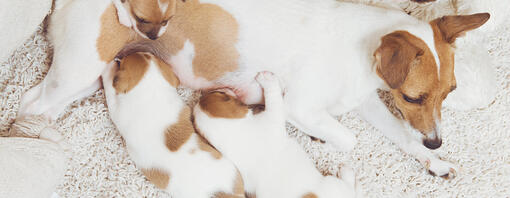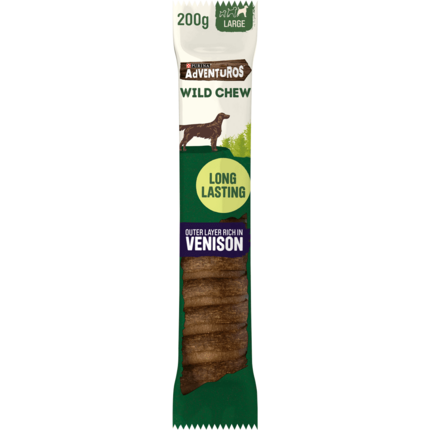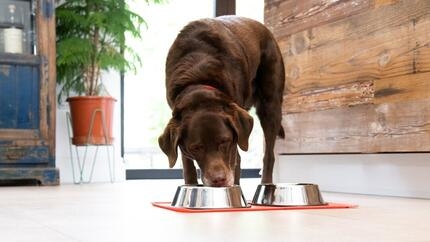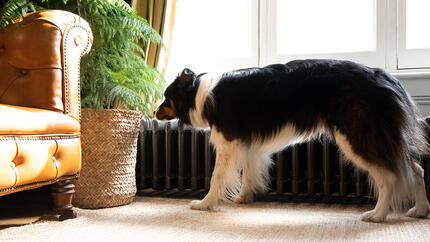
When your dog is happy, you’re happy – and when your pet is pregnant, making sure they're as healthy and comfortable as possible is even more important, both for the mum-to-be and for the new arrivals!
There are several things that you can do to ease the strain of having little bundles of joy, and ensure that everything goes smoothly. It’s an exciting time! During pregnancy, your dog will need your love and attention more than ever. Remember, as their body change, you will have to change the way you care for your dog in a few simple ways to make sure that they have everything they needs.
Feeding and nutrition during your dog's pregnancy
If you’re wondering what to feed a pregnant dog, you’re not alone – most dog owners ask this question! It’s important to know that basic adult-formula dog food won't provide the extra nutrients they need during pregnancy, so you’ll need to make some diet changes to help your pet get what they needs from their food.
Slowly switch your dog back to a high-quality puppy formula just before mating, introducing her slowly over a period of 7-10 days to avoid upsetting their stomach. Your dog should stay on this new formula until after they have given given birth, and the puppies have been weaned.
What you should feed your dog will also depend on the body condition and any medical problems that they may currently have or has had in the past, so make sure you check with your vet before changing the food.
For more details on what to feed a pregnant dog, visit feeding during pregnancy.
"Dogs are man’s best friend, but need you to care for them too when they are expecting. Purina offer simple tips on how you can support them during pregnancy."
Exercise and dog pregnancy
When caring for a pregnant dog, regular walks will help keep up their strength, so your dog is primed and ready for the arrival of the little ones! Avoid any intensive training, showing, or even obedience schooling though during pregnancy as this can be stressful, and bumps or knocks to the body from boisterous dogs could hurt the unborn puppies.
Walking is a great way to help expectant mums keep fit, which will make her much more capable of handling labour and birth. Try to keep walks shorter but more regular during her pregnancy, as mum will most likely become a bit uncomfortable and tired as her pregnancy goes on. Aim for three to five short walks a day.
Are vaccinations allowed during your dog's pregnancy?
As mums pass on immunity to their puppies through their milk, your pet should ideally be up to date with all of their dog vaccines before mating, so that her antibody levels are at their peak.
If your dog’s vaccinations are overdue during pregnancy, speak to your vet. Some vaccines can be used when she is pregnant, but you will need to check which are safe for both mum and her unborn puppies.
Parasite treatment during dog pregnancy
An important part of pregnant dog care is continuing to keep up with the flea and worming treatments.
Mum can pass roundworms and hookworms onto her unborn puppies, so stay safe and treat your dog with products that are safe to use during pregnancy. Discuss this with your vet, as the puppies may also need worming regularly during their first few weeks.
Building a ‘nest’ in the final stages of your dog's pregnancy
In the final stages of dog pregnancy, your dog will want a private place to relax and peacefully give birth in. You can help your pet by building a ‘nest’ where they can feel warm, comfortable and safe for the delivery of the puppies.
A cardboard box filled with clean blankets, sheets or towels works particularly well. Place the nest in a quiet spot so other pets or children do not disturb her! It’s not unusual for soon-to-be mums to choose somewhere else other than the nest you’ve built, but try to encourage her gently back to your chosen spot.
Keep the nest at room temperature (don’t forget to check for any draughts) to make sure your dog and the new puppies are comfortable.
Next, find out more about the potential dog birth and labour problems and what you need to look out for.













